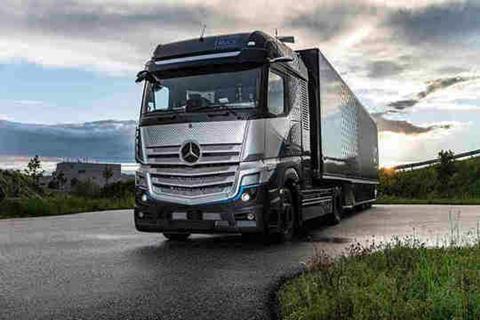
Mercedes-Benz believes the total cost of ownership (TCO) of running battery electric trucks, could be the same as diesel trucks in just four years.
Andreas von Wallfeld, head of marketing, sales and services at Mercedes-Benz Trucks, said: “Although it depends on many factors, such as subsidies, kWh pricing of energy and of course the local situation, we expect to see TCO parity on battery vehicles by between 2025 and 2027.”
But he said the timeframe was harder to predict with hydrogen fuel cell vehicles, mainly due to uncertainty over how quickly the filling infrastructure will develop. With this in mind his best prediction is between 2027 and 2030. “But it will come, as we know this is the future. And it may come quicker than we expect because the topic of climate change is so high on political agendas.”
Read more
- Frustrated operators reveal why 80% are sticking with diesel
- One-fifth of operators to try alternative fuels within three years, new research reveals
- Nikola CEO slams truck manufacturers for avoiding switch to alternative fuels
Mercedes is embarking on a dual electrification strategy, and will be offering both battery- and fuel cell-electric trucks. Its eActros will go into full scale production next month, and will be followed by the eEconic in the second half of 2022. Its eActros LongHaul, with a predicted 500km range, will be on sale from 2024, and three years later it will be joined by the first series production GenH2 hydrogen fuel cell trucks (pictured).
Mercedes Trucks’ parent company Daimler Trucks has pledged to be emission-free in Europe, North America and Asia by 2039, and expects diesel-powered trucks to account for just 50% of its production by 2030.
l Mercedes-Benz has also revealed that it will launch a zero-tailpipe emissions version of its Econic in the second quarter of 2022.
The battery-powered truck, which will initially only be available in 6x2/4 rigid configurations, will be equipped with three 105kWh battery packs. Twin liquid-cooled motors will generate a continuous output of 330kW and peak output of 400kW.
Linda Fritzenwanker, product manager Econic and head of eEconic sales project, explained that a distribution model was also be available, featuring a two-seat cab. She also confirmed that eEconic will replace the CNG-powered version of Econic.













